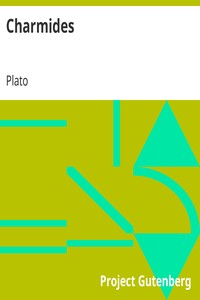Charmides by Plato
“Charmides” by Plato is a philosophical dialogue written during the 4th century BC. The text primarily explores the concept of temperance (or moderation) through a dynamic conversation between Socrates and various other characters, including the beautiful youth Charmides, as they grapple with the meaning and implications of this virtue. The opening of "Charmides" introduces the setting and characters, establishing Socrates as the narrator and providing glimpses into his relationships with the others.
Socrates returns from military service and finds himself in the company of friends at a palaestra. A discussion arises about the young Charmides, who enters to great admiration for his physical beauty, prompting an inquiry into whether he possesses the moral quality of temperance. Socrates engages Charmides in a series of definitions and logical examinations regarding the nature of temperance. They explore various interpretations, including quietness, modesty, and self-knowledge, while also confronting the complexities inherent in defining such virtues. The beginning serves not only to engage readers with the characters but also sets the stage for deeper philosophical inquiries central to Plato's work. (This is an automatically generated summary.)
Read or download for free
| How to read | Url | Size | |||
|---|---|---|---|---|---|
| Read now! | https://www.gutenberg.org/ebooks/1580.html.images | 165 kB | |||
| EPUB3 (E-readers incl. Send-to-Kindle) | https://www.gutenberg.org/ebooks/1580.epub3.images | 115 kB | |||
| EPUB (older E-readers) | https://www.gutenberg.org/ebooks/1580.epub.images | 117 kB | |||
| Kindle | https://www.gutenberg.org/ebooks/1580.kf8.images | 199 kB | |||
| older Kindles | https://www.gutenberg.org/ebooks/1580.kindle.images | 187 kB | |||
| Plain Text UTF-8 | https://www.gutenberg.org/ebooks/1580.txt.utf-8 | 140 kB | |||
| Download HTML (zip) | https://www.gutenberg.org/cache/epub/1580/pg1580-h.zip | 113 kB | |||
| There may be more files related to this item. | |||||
Similar Books
About this eBook
| Author | Plato, 428? BCE-348? BCE |
|---|---|
| Translator | Jowett, Benjamin, 1817-1893 |
| Title | Charmides |
| Note | Wikipedia page about this book: https://en.wikipedia.org/wiki/Charmides_(dialogue) |
| Credits | Produced by Sue Asscher, and David Widger |
| Reading Level | Reading ease score: 62.7 (8th & 9th grade). Neither easy nor difficult to read. |
| Language | English |
| LoC Class | B: Philosophy, Psychology, Religion |
| LoC Class | PA: Language and Literatures: Classical Languages and Literature |
| Subject | Classical literature |
| Subject | Socrates, 470 BC-399 BC |
| Subject | Ethics -- Early works to 1800 |
| Subject | Knowledge, Theory of -- Early works to 1800 |
| Subject | Temperance -- Early works to 1800 |
| Category | Text |
| EBook-No. | 1580 |
| Release Date | Dec 1, 1998 |
| Most Recently Updated | Jan 16, 2013 |
| Copyright Status | Public domain in the USA. |
| Downloads | 812 downloads in the last 30 days. |
| Project Gutenberg eBooks are always free! | |

